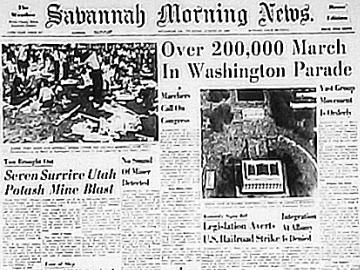
Section Branding
Header Content
March Inspired Future Savannah Mayor
Primary Content

Edna Jackson is a blur of motion in her ornate, wood paneled office at City Hall.
She's running late because she's calling setting up last-minute meetings.
"All right, now hold on a minute," she says. "I got to make one more phone call."
Jackson has been in motion ever since she joined the Civil Rights movement at age nine.
Now 68, she remembers sit-ins at stores on Broughton Street, protests at the beach on Tybee Island and trips to small towns throughout the region to register voters.
"Yes, we were spat on, we were taken to jail," Jackson says. "Those things happened. But, we did it and we prayed and we sang a lot of freedom songs when we felt our lives were in danger at that time."
Fifty years ago, Savannah was in tumult.
The city erupted into riots.
An unidentified state patrolman described the response to WSB in archive television footage.
"We have 50 men on the scene in the Savannah area," the officer said. "They are equipped with hand grenades, the night sticks, the crash helmets, gas masks."
Police also used tear gas and fire hoses.
Demonstrators responded by throwing stones, setting fires and breaking windows.
Edna Jackson was 18-years-old.
And the NAACP had hired her at the rate of $25 a week to register voters in Florida.
"Live Oak, Florida. Pahokey, Florida," she says. "You know, we went into that community because there were demonstrations. We did mainly voter registration. So, we had a role to play. We lived in a minister's house."
So it was from Tampa that Jackson, her sister and a small group of protesters drove in three NAACP-hired station-wagons to the nation's capital.
When the speeches began, she was standing near the reflecting pool.
She says the heat was oppressive.
"You were hoping you could put your feet in the water," she says. "Yes, it was very hot. But you didn't think about that."
Jackson says the march invigorated those like her who were active in the Civil Rights struggle.
She continued working for the NAACP for five more years.
And for those who weren't active, she says the clear and moving rhetoric of that day compelled them to be more involved.
When asked how often she thinks of that day, she says, "Every day of my life because I would not be sitting here in this seat had it not been for those kinds of great things happening in my life. It engaged people to say 'I want to be a part of this.'"
Jackson worked 30 years as a social worker before entering politics.
As mayor, one of her priorities has been the city's biting poverty, a reason many marched in 1963..
Other Georgia leaders remember the march.
Congressman John Lewis is the only living speaker from that day.
State Senator Nan Orrock is among state lawmakers who attended.
Tags: Florida, NAACP, Savannah, WSB-TV, Tybee Island, Civil Rights, history, Georgia State Patrol, Tampa, GPBnews, Savannah Mayor, voter registration, orlando montoya, protests, African-American History, desegregation, Georgia State Patrol Trooper, Edna Jackson, Riot, race riot, Mayor Edna Jackson, savannah city hall, Broughton Street, March on Washington, the March on Washington, 50th anniversary of the march on washington
